 Petzlover
Petzlover German Coolie is originated from Australia but Yo-Chon is originated from United States. German Coolie may grow 30 cm / 12 inches higher than Yo-Chon. German Coolie may weigh 20 kg / 45 pounds more than Yo-Chon. German Coolie may live 4 years more than Yo-Chon. Both German Coolie and Yo-Chon has same litter size. German Coolie requires Low Maintenance. But Yo-Chon requires Moderate Maintenance
German Coolie is originated from Australia but Yo-Chon is originated from United States. German Coolie may grow 30 cm / 12 inches higher than Yo-Chon. German Coolie may weigh 20 kg / 45 pounds more than Yo-Chon. German Coolie may live 4 years more than Yo-Chon. Both German Coolie and Yo-Chon has same litter size. German Coolie requires Low Maintenance. But Yo-Chon requires Moderate Maintenance
 The German Coolie is misnamed as it is an Australian bred dog and often called the Australian Koolie or Coolie. This Australian breed is more often just called a Coolie. The breed is a typical herding breed and a working dog that needs a job all the time. They have been a favorite of Australians since the late 1800’s when local dogs were bred with British working dogs.
The German Coolie is misnamed as it is an Australian bred dog and often called the Australian Koolie or Coolie. This Australian breed is more often just called a Coolie. The breed is a typical herding breed and a working dog that needs a job all the time. They have been a favorite of Australians since the late 1800’s when local dogs were bred with British working dogs.
Although all Coolie’s are not the same. Within the breed there is a lot of variation. This is because the Coolie was bred individually for different regions in Australia. In a very different writing the Koolie Club of Australia does not define the Coolie breed on confirmation as all other purebred dogs are defined. Instead the Coolie is defined by ability to work. In light of this most Coolie breeders state that the Coolie is a breed and the variations you see among regions are types within the breed.
As a herding dog, the Coolie brought a lot of skill to the Australian farmers and sheep herders. The Coolie will round up the sheep and bring them back to their enclosure at the shepherd’s command. They are upright, silent, working dogs. Not only do they herd sheep they are important at sheering to “cut out” the sheep or assist in the close quarters of lambing.
In Queensland North and New South Wales, the Coolie is medium boned, tall and agile ready to herd cattle over a long stretch of miles. In the Snowy Mountains of New South Wales and the Hunter Valley Region, the Coolie is shorter and thicker in order to be able to get cattle that are lying low out from the gullies and dense bush. The Coolies found in Victoria are the smallest of all.
No matter where they live and work, the Coolie is bred to help the workers there, the farmers, the stockman, and the grazier. All Coolies are adaptable and very agile. They all have a strong willfulness to accomplish what they are asked to do. The ancestors of these various Coolie was the British Collie – a smooth coated, blue merle. This Collie was crossed with the Black and Tan Collie from the Scottish Highlands. It is believed that these are the same Collie breeds that came to Australia to create the Heeler.
The name may come from the German immigrants working in South Australia and unable to pronounce Collie incorrectly they called the dogs German Coolies. There is also a fraction of German breeders who believe that the German Tiger dog was brought to Australia in the 18th century and then when the Collies came they were bred together. Many Coolie breeders have records showing that the breed has been in Australia for at least 160 years. It is also believed that the Border Collie and Kelpie (Blue Heeler) were mixed into the breed at sometime as well.
No bench standard exists for the German Coolie even though there is the Koolie Club of Australia. The mission of the club is to protect, preserve and promote the breed. The Australian Sporting Register was recognizing the Coolies in 2004. They are eligible to participate in the Australian National Kennel Council sanctioned sporting trials. They participate in Queensland, New South Wales and Victoria through the individual states sporting register. Here they participate in herding, jumping, obedience, agility and tracking.
Several other recognitions as a herding breed soon followed. The Australian Shepherd Club of America, the American Herding Breed Association, were followed by recognition from others as well. They are not recognized by the American Kennel Club (AKC).
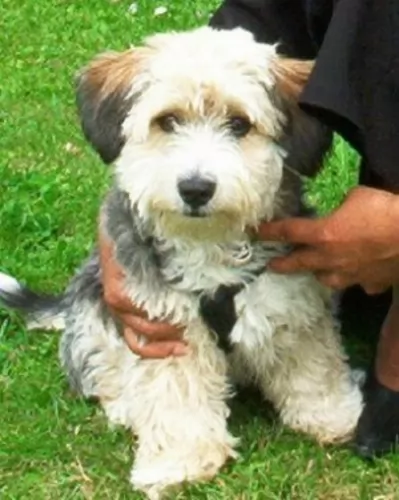 The Yorkie Bichon or Yo-Chon as he is fondly referred to as a designer crossbreed hailing from the United States.
The Yorkie Bichon or Yo-Chon as he is fondly referred to as a designer crossbreed hailing from the United States.
Information isn’t readily available on the origins of this cute little dog, but the dog is believed to be a cross between a Bichon Frise and Yorkshire Terrier.
It is thought that the dog was developed in the United States from about 1998 to 2001. As a hybrid, the Yorkie Bichon isn’t recognized by the American Kennel Club.
 With their strong ancestry among the family of collies and herders, the German Coolie shares the look of collies and shepherds. Even though they differ from region to region and there is no actual standard, they are medium sized dogs with blue or brown eyes or even one of each. The ears are folded over on top when relaxed but they are rigid and straight when he is more alert. The nose is either chocolate or red depending on the color of their coat.
With their strong ancestry among the family of collies and herders, the German Coolie shares the look of collies and shepherds. Even though they differ from region to region and there is no actual standard, they are medium sized dogs with blue or brown eyes or even one of each. The ears are folded over on top when relaxed but they are rigid and straight when he is more alert. The nose is either chocolate or red depending on the color of their coat.
They can have either a long, medium or short coat but most owners want the short coat that is smooth as well. The coat can be one color – red/chocolate or black; Bi – red/white or black/white; Tri – solid black or red with white and brown; Tri merle -merle with white and brown; Merle – red merles and blue merles. Regardless of color, the German Coolie has the look of a collie or German Shepherd.
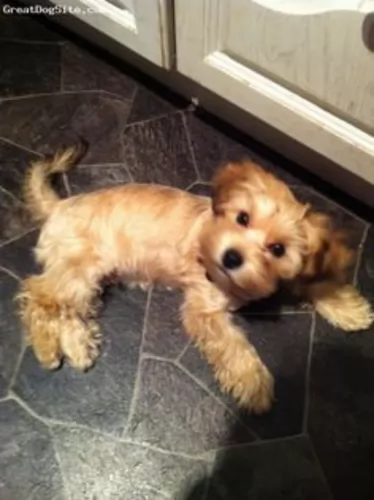 The Yo-Chon stands between 25 and 30cm and weighs in the region of 2 to 4kg. He can be like a teddy-bear this little dog and the coat can be either silky and straight or wavy. It is medium length and some people have the coat professionally trimmed.
The Yo-Chon stands between 25 and 30cm and weighs in the region of 2 to 4kg. He can be like a teddy-bear this little dog and the coat can be either silky and straight or wavy. It is medium length and some people have the coat professionally trimmed.
The low shedding coat comes in a variety of colors – cream, grey, tan, white, black or bi-colored.
Your Yorkie Bichon will no doubt have some habits that come from both parent breeds. Your dog is likely to be independent, social, friendly, social and loving, wanting to spend lots of time with you.
They’re small but they make good watchdogs with their high-pitch bark. Your Yo-Chon is an intelligent little dog too and by having him trained and socialized he is well behaved and pleasant to have around. You can tell him to lie down, sit or stay which is useful when you have visitors.
He gets on well with children, but the puppies particularly are tiny and fragile and they can easily get hurt by untrained and undisciplined children.
 Yes, they can be very friendly with children is they are socialized and supervised.
Yes, they can be very friendly with children is they are socialized and supervised.
They have enough stamina to work for 14 hours a day.
They are very adaptable. They can be calm and steady when working a mother and baby lamb and then be able to forcefully move steers, bull, rams or weathers.
The breed is highly intelligent, and their learning ability is excellent because they want to please you.
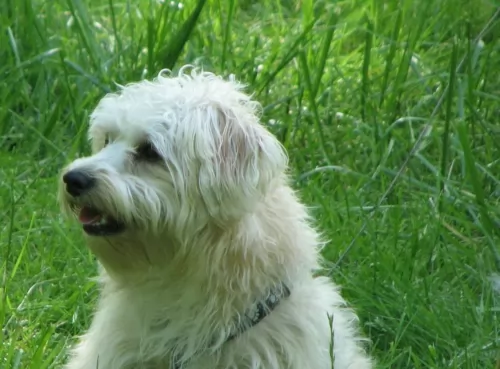 The Yo-Chon is an independent, happy dog who loves nothing more than to be surrounded by all his favorite human beings.
The Yo-Chon is an independent, happy dog who loves nothing more than to be surrounded by all his favorite human beings.
They are loving, loyal and gentle dogs and are good playmates for children who have been taught how to handle them with care and kindness.
He is smart and has an amicable nature and will take kindly to being trained and socialized.
With the Yo-Chon in your life, you can be sure you’re going to benefit from having a splendid family pet and companion.
 This is a relatively healthy breed without many genetic disorders found in purebreds due to the 160 years they have spent fairly isolated and allowing natural selection to take its course.
This is a relatively healthy breed without many genetic disorders found in purebreds due to the 160 years they have spent fairly isolated and allowing natural selection to take its course.
In Merle dogs there can be deafness and/or blindness. If you breed a solid to a merle you can eliminate that.
These are not inherited but rather acquired due to the immense amount of jumping and running.
Rare but it does occur and can be fatal if not treated
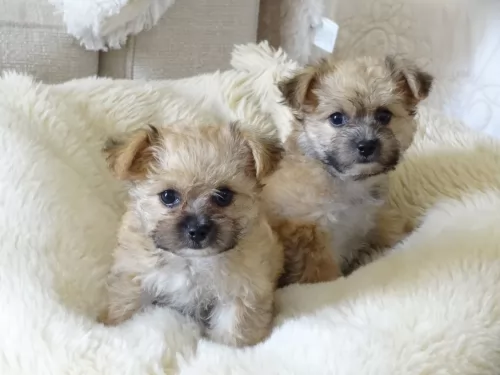 Both the Yorkie and Bichon Frise are dog breeds that are prone to Legg-Calvé-Perthes disease. This is when there is insufficient blood supply to the hind thigh bone, so the dog becomes lame.
Both the Yorkie and Bichon Frise are dog breeds that are prone to Legg-Calvé-Perthes disease. This is when there is insufficient blood supply to the hind thigh bone, so the dog becomes lame.
Surgical correction is necessary. Like small dogs in general, the Yochon might have dental issues. Slipped kneecaps, hypothyroidism and eye problems might affect the Yochon as well.
 Break meals into 3 a day feeding a high quality dry puppy food designed for dogs of his size. 11/2 to 2 cups per day.
Break meals into 3 a day feeding a high quality dry puppy food designed for dogs of his size. 11/2 to 2 cups per day.
Break meals into 2 a day feeding a high quality dry adult food designed for dogs of his size.
Traditionally good health. Great energy, intensity and devotion to work and owner.
This is an energetic dog that loves to work and needs to work. Regular routine exercise is needed daily. He needs to be stimulated mentally and physically. Find him a job. Make sure he knows what you want him to do. They work well with a human partner in games such as agility, tracking, flyball and herding. They need a large yard and a lot of play time. They are not couch potatoes and would be unhappy if they were stuck in a house or apartment
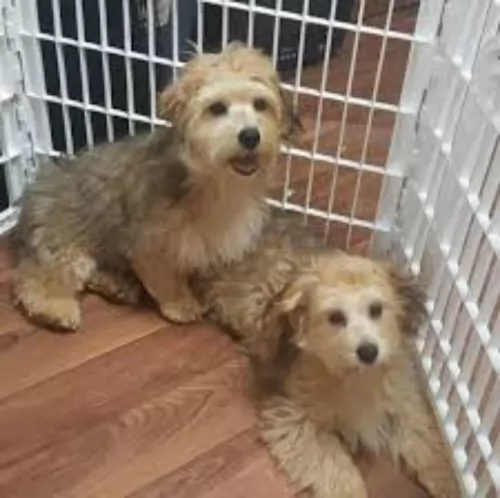 Everybody is busy and they don’t always have time to exercise their pets. As a human being, your health relies heavily on the exercise you get so you and your dog can exercise together.
Everybody is busy and they don’t always have time to exercise their pets. As a human being, your health relies heavily on the exercise you get so you and your dog can exercise together.
These days if you seriously don’t have time and you have money to spare, there are excellent doggy daycare centers where your dog can have fun playtimes with other dogs and people.
Dog exercises will change over time with age but at least try to get used to giving your pet a walk every day as this kind of exercise can extend into old age with both you and your pet.
Swimming, ball games, fetch games and walks or hikes are all great forms of exercise.
Good nutrition ensures your Yorkie Bichon has a good chance to be healthy and energetic. Some of the commercially manufactured dog foods you get are made with bad ingredients and they can make your dog sick.
The good quality ones can be nutritious for your dog and also wonderfully convenient. Always read the packaging labels so you know what your dog’s getting.
Cooked vegetables, boiled chicken and brown rice, nicely chopped up and added to the dry kibble can add variety to your pet’s diet while remaining deliciously nutritious and tasty as well.
Brush your Yo-Chon at least twice a week to keep the hair silky and shiny. Clip your dog’s nails when they get long.
Check inside his ears for signs of redness and the possibility of an infection. Try and look inside his mouth too for bad teeth as this can cause lots of health problems for your pet.
If you don’t have the time to do all these things, there are professional pet groomers who will do all these grooming chores for you.